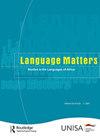达维达语的名词类与一致
IF 0.8
3区 文学
0 LANGUAGE & LINGUISTICS
引用次数: 0
摘要
摘要本文概述了大威达名词类系统,该系统由15个类和4个子类组成。15个主要类中的每一个都是一组名词,它们使用相同的名词前缀,并具有共同的一致性范式。子类触发与它们所引用的主类相同的协议,但具有不同的标称前缀。《大威达》中单数与复数的对立只出现在名词类系统中。在11个已证实的单数和复数名词之间的类相关性中,有9个相关性是最普遍的班图数配对或所谓的性别。从句法角度来看,语言中存在两种类型的一致性:(a)修饰语与名词短语的头名词的一致性;(b)动词形式与主宾名词短语的一致性。从形态上区分名词前缀和5个系列的从属前缀。本文章由计算机程序翻译,如有差异,请以英文原文为准。
Noun Classes and Agreement in Dawida
Abstract This article presents an overview of the Dawida noun class system, which consists of 15 classes and 4 subclasses. Each of the 15 main classes is a set of nouns that take the same nominal prefix and have common agreement paradigms. Subclasses trigger the same agreement as the main classes they refer to, but have different nominal prefixes. The opposition between singularity and plurality in Dawida only occurs in the system of noun classes. Among 11 attested class correlations between singular and plural nouns, 9 correlations are the most widespread Bantu number pairings or so-called genders. From a syntactic point of view, two types of agreement exist in the language: (a) agreement of modifiers with the head noun of the noun phrase, and (b) agreement of verb forms with the subject/object noun phrase. Morphologically, the noun prefixes and 5 series of dependent prefixes are distinguished.
求助全文
通过发布文献求助,成功后即可免费获取论文全文。
去求助
来源期刊

Language Matters
Multiple-
CiteScore
1.20
自引率
0.00%
发文量
19
期刊介绍:
The purpose of Language Matters is to provide a journal of international standing with a unique African flavour focusing on multilingualism in Africa. Although the journal contributes to the language debate on all African languages, sub-Saharan Africa and issues related to multilingualism in the southern African context are the journal’s specific domains. The journal seeks to promote the dissemination of ideas, points of view, teaching strategies and research on different aspects of African languages, providing a forum for discussion on the whole spectrum of language usage and debate in Africa. The journal endorses a multidisciplinary approach to the study of language and welcomes contributions not only from sociolinguists, psycholinguists and the like, but also from educationalists, language practitioners, computer analysts, engineers or scholars with a genuine interest in and contribution to the study of language. All contributions are critically reviewed by at least two referees. Although the general focus remains on multilingualism and related issues, one of the three issues of Language Matters published each year is a special thematic edition on Language Politics in Africa. These special issues embrace a wide spectrum of language matters of current relevance in Southern Africa.
 求助内容:
求助内容: 应助结果提醒方式:
应助结果提醒方式:


